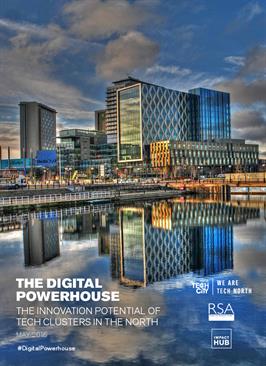From the launch of the C4DI co-working space in Hull, to the expansion of Newcastle’s Ignite accelerator programme, the North’s digital economy has begun to make a significant mark on the region. Our report, created in partnership with Tech North and the Impact Hub, looks at how Northern tech clusters can build on this foundation by forging closer connections with surrounding industries and public services.
The North’s digital economy is thriving. Over 280,000 people are employed in the tech industry, contributing £9.9 billion to the region’s economy. Digital jobs are growing at 10 times the rate of employment in non-tech sectors, and people who work in the industry are paid on average 60 percent higher than their counterparts in the rest of the economy.
How can we ensure the North’s ‘Digital Powerhouse’ continues to grow? The government and tech advocates have so far focused their attention on boosting the supply of talent, opening up new avenues for finance, fostering a collaborative culture, and investing in transport, broadband and other forms of infrastructure.
Each of these creative conditions are vital to the success of tech clusters, but our report argues that we need to pay more attention to another important factor: market opportunities. By this we mean the ability of tech firms to win paying customers and create products and services that respond to unmet needs. Over a third of ICT businesses nationwide say they are weak at entering into new markets, and nearly a quarter say they have difficulty introducing new products and services.
The Digital Powerhouse looks in particular at how tech businesses can connect more effectively with the market opportunities on their doorstep. Whether it is an EdTech company working with local schools to bring e-learning to the classroom, or a data analytics startup helping nearby manufacturers improve machine efficiency on the factory floor, the scope for win-win collaborations in the region is vast.
Ultimately, this report argues that the North can pioneer a different way of ‘doing tech’ that is more anchored in the surrounding community. Tech clusters typically become famous for their billion dollar IPOs, celebrity founders and cult brand followings. But there is as much to be said for tech hubs that are woven into the fabric of the places in which they operate, helping nearby industries and public services as they try to navigate their way through a new and challenging digital era.
Download the report: The Digital Powerhouse (PDF, 3.3MB)
Read Tech North’s Digital Powerhouse series
pdf 3.3 MB
Contributors


